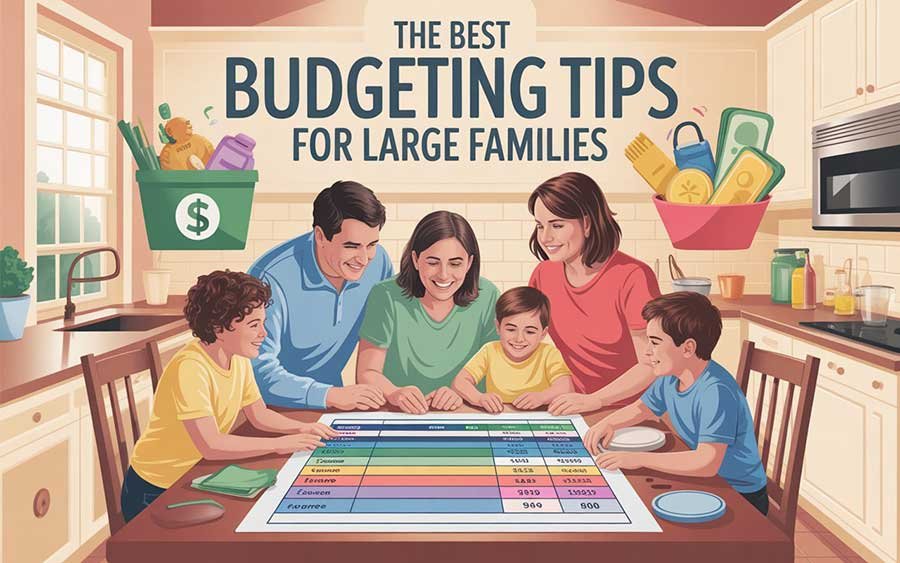
The Best Budgeting Tips for Large Families
Raising a large family is a beautiful and rewarding experience—but let’s face it, it also comes with serious financial pressure. Between groceries, clothes, school supplies, medical bills, and those never-ending snack requests, it can feel impossible to stay ahead. But here’s the good news: budgeting for a large family is absolutely doable, even on a tight income.

This guide dives into the most effective budgeting strategies tailored specifically for families with multiple children. We’ll break it all down into actionable steps you can start today—along with real-life success stories, helpful hacks, and inspirational quotes to keep you going.
Why Large Families Need a Unique Budgeting Approach
When you have four, five, or even more people to feed, clothe, and transport, traditional budgeting advice doesn’t always cut it. What works for a single person or couple may not stretch the same way in a busy household.
Large families often face:
- Higher grocery and household expenses
- Constantly changing needs (hello, growth spurts!)
- Multiple school-aged kids with different schedules and needs
- Less room for impulse spending or financial surprises
A good budget for a large family must be flexible, collaborative, and ruthlessly intentional.
Step-by-Step Budgeting Tips for Large Families
1. Know Your Exact Numbers
Start with a full snapshot of your monthly income and expenses. You can’t control what you don’t measure.
Use a spreadsheet, budgeting app, or printable worksheet to list:
- Take-home pay
- Fixed expenses (rent, insurance, car payments)
- Variable expenses (groceries, gas, clothing)
- Debts
- Savings contributions
Be brutally honest. Include every expense—even the tiny ones.
2. Involve the Whole Family
Budgeting works better when it’s a team effort. Talk to your kids about money, needs vs. wants, and saving goals. It builds responsibility—and they might surprise you with creative solutions.
Set family goals like saving for a vacation or a new car and get everyone involved.
3. Create a Master Grocery Plan
Groceries are often the biggest expense for large families. Here’s how to cut that down:
- Plan meals weekly
- Shop with a list (and stick to it!)
- Buy in bulk when it makes sense
- Use apps like Ibotta or Fetch for cashback
- Cook big batches and freeze leftovers
Real-life example: The Wilsons, a family of seven, save $300/month just by meal planning and avoiding convenience foods.
4. Embrace Hand-Me-Downs and Thrift Stores
Don’t underestimate the savings in gently used clothing, furniture, and toys. Many large families swear by thrift shops, Facebook Marketplace, and local swaps.
Clothing swaps with friends or church groups can save hundreds a year.
5. Automate and Prioritize Savings
Even $10 or $20 a week adds up. Use automatic transfers to build an emergency fund and separate accounts for:
- School expenses
- Birthdays or holidays
- Unexpected medical costs
Make saving a regular bill—not an afterthought.
6. Use the Envelope or Cash System
This old-school method still works wonders. Divide your cash into envelopes by category (groceries, gas, entertainment) and only spend what’s in the envelope.
Tip: Try this for problem areas where overspending tends to happen.
7. Take Advantage of Discounts and Freebies
Many stores and programs offer discounts for large families. Check:
- Museum or zoo family passes
- School lunch assistance
- Utility bill discounts
- Local free events or programs for kids
Real-life example: The Martinez family found $1,200 a year in savings just from family discounts and tax credits.
8. Limit Subscription Services
Streaming, boxes, apps, software—monthly subscriptions can silently drain your wallet. Review and cancel what you don’t use.
Create a rule: only one entertainment subscription at a time.
9. Batch Your Errands to Save on Gas
Instead of running multiple trips during the week, plan one or two errand days. This saves on fuel and frees up time.
Group activities by location and use carpooling where possible.
10. Track Everything Weekly
A monthly budget is great, but weekly check-ins help you course-correct before things get out of hand.
Use color-coded trackers, a dry-erase board, or budgeting apps to see where you’re at.
Real Families Making It Work
The Andersons, a family of eight, use a digital budget board in the kitchen so everyone can see what’s being spent. Their kids help decide which family treat they’ll save for next—pizza night, movie night, or a day trip.
Lauren, a mother of five, swears by freezer cooking and monthly meal prep. She and her sister split bulk buys from Costco and prep meals together once a month to save time and money.
Tom and Gina, parents of six, use color-coded envelopes for each child’s activities and expenses. It keeps things clear and reduces the stress of juggling school fees, sports, and supplies.
20 Quotes to Inspire Smart Family Budgeting
“A budget is telling your money where to go instead of wondering where it went.” – Dave Ramsey
“Do not save what is left after spending; instead spend what is left after saving.” – Warren Buffett
“Financial peace isn’t the acquisition of stuff. It’s learning to live on less than you make.” – Dave Ramsey
“You must gain control over your money or the lack of it will forever control you.” – Dave Ramsey
“Beware of little expenses; a small leak will sink a great ship.” – Benjamin Franklin
“The cost of a thing is the amount of life you exchange for it.” – Henry David Thoreau
“A penny saved is a penny earned.” – Benjamin Franklin
“Frugality includes all the other virtues.” – Cicero
“Don’t go broke trying to look rich.” – Unknown
“Money looks better in your bank than on your feet.” – Unknown
“It’s not your salary that makes you rich, it’s your spending habits.” – Charles A. Jaffe
“Rich people stay rich by living like they’re broke.” – Unknown
“You don’t need more money. You need better habits.” – Unknown
“Live like no one else now, so you can live like no one else later.” – Dave Ramsey
“A budget isn’t restrictive. It gives you freedom.” – Rachel Cruze
“When you take control of your money, you take control of your life.” – Suze Orman
“Sacrifice a few wants now to protect all your needs later.” – Unknown
“Being frugal isn’t about giving things up. It’s about choosing what matters.” – Unknown
“Budgeting is the roadmap to financial peace.” – Unknown
“Every dollar you save is a step toward financial freedom.” – Unknown
🧠 Picture This
Picture this: You sit at the kitchen table, surrounded by the buzz of your big, happy family. Your budget is posted on the fridge. Everyone knows the plan. Groceries are stocked. Bills are covered. You’re not stressed—you’re prepared.
Your kids are learning life skills. You’re saving for the future. You’ve found peace—not in having everything, but in mastering what matters most.
What would life feel like if your family was finally in financial harmony?
📣 Please Share This Article
If this helped you, please share it with another large family who’s trying to manage the chaos of budgeting. Let’s support each other on the journey to financial peace.
⚠️ Disclaimer
This article is based on personal experiences and general budgeting strategies. It is not financial advice. For personalized financial guidance, please consult a certified financial advisor.






